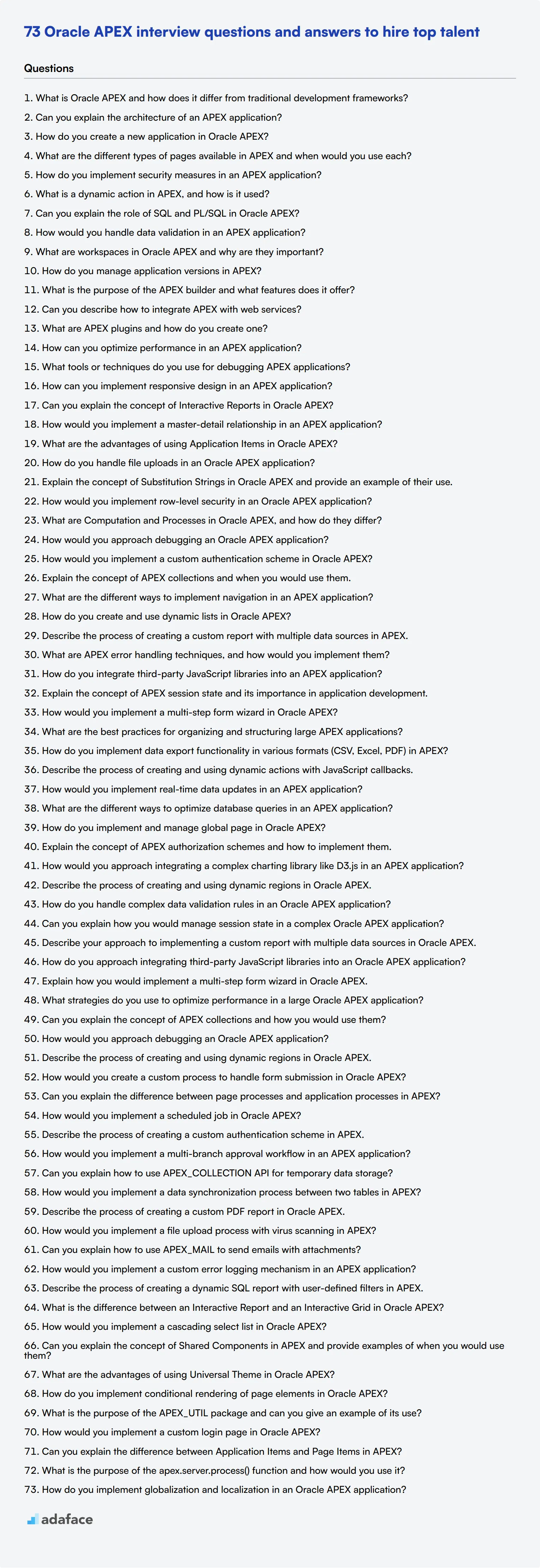As hiring managers and recruiters, identifying top talent for Oracle APEX roles is crucial for the success of your projects. This list of carefully curated questions and answers will help you efficiently evaluate candidates' skills and knowledge during interviews.
This blog post covers basic to advanced Oracle APEX interview questions, targeting various skill levels from junior to senior developers. Additionally, it includes questions related to processes, tasks, and technical definitions within Oracle APEX.
By utilizing this comprehensive set of questions, you can ensure a thorough assessment of your candidates' capabilities. To further streamline the process, consider using our Oracle PL/SQL Online Test before conducting interviews.
Table of contents
16 basic Oracle APEX interview questions and answers to assess applicants
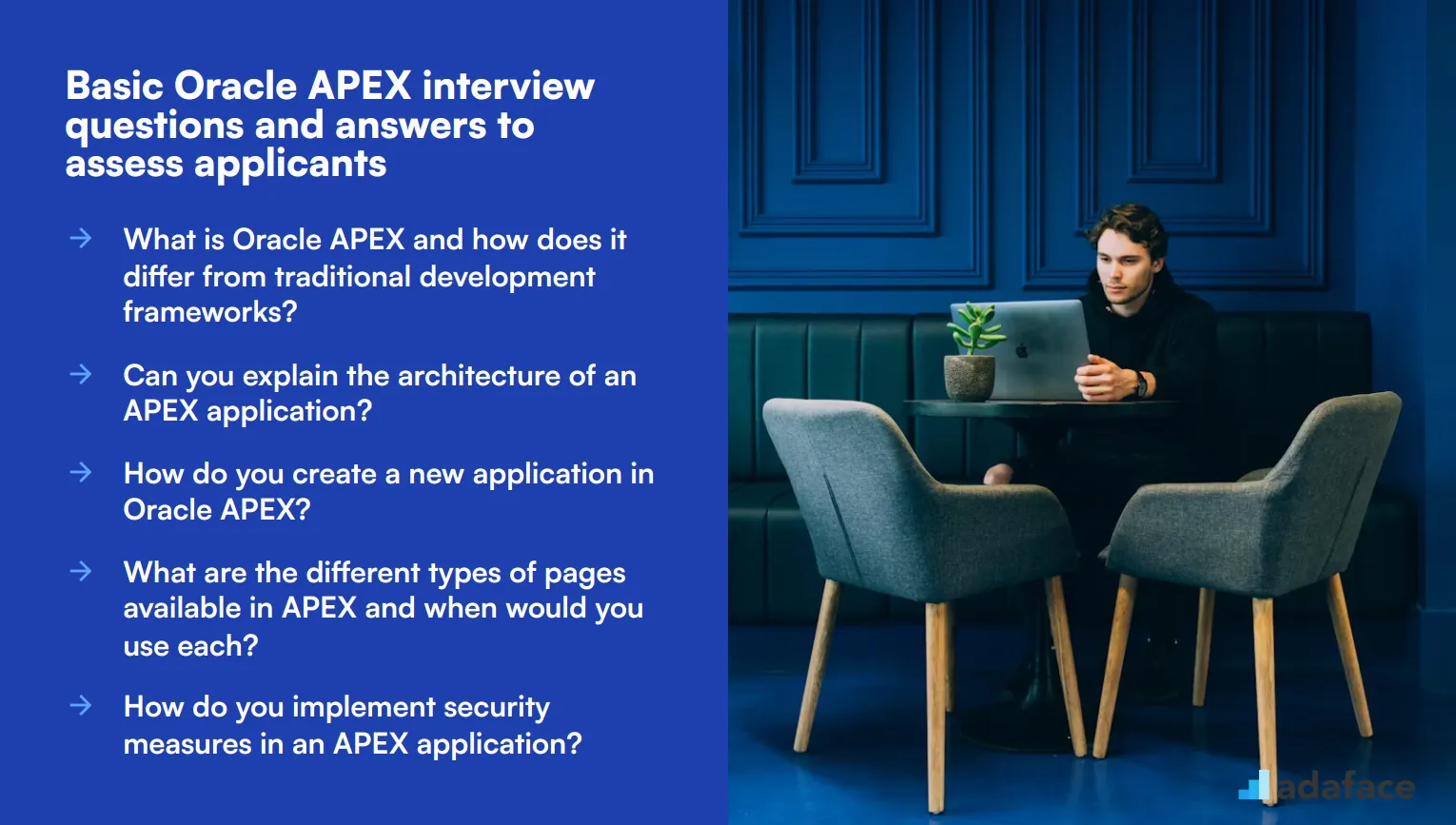
To effectively evaluate your applicants' proficiency in Oracle APEX, consider using this concise list of interview questions. These questions will help you gauge their understanding of fundamental concepts and practical skills, ensuring you find the right fit for your application developer role.
- What is Oracle APEX and how does it differ from traditional development frameworks?
- Can you explain the architecture of an APEX application?
- How do you create a new application in Oracle APEX?
- What are the different types of pages available in APEX and when would you use each?
- How do you implement security measures in an APEX application?
- What is a dynamic action in APEX, and how is it used?
- Can you explain the role of SQL and PL/SQL in Oracle APEX?
- How would you handle data validation in an APEX application?
- What are workspaces in Oracle APEX and why are they important?
- How do you manage application versions in APEX?
- What is the purpose of the APEX builder and what features does it offer?
- Can you describe how to integrate APEX with web services?
- What are APEX plugins and how do you create one?
- How can you optimize performance in an APEX application?
- What tools or techniques do you use for debugging APEX applications?
- How can you implement responsive design in an APEX application?
8 Oracle APEX interview questions and answers to evaluate junior developers
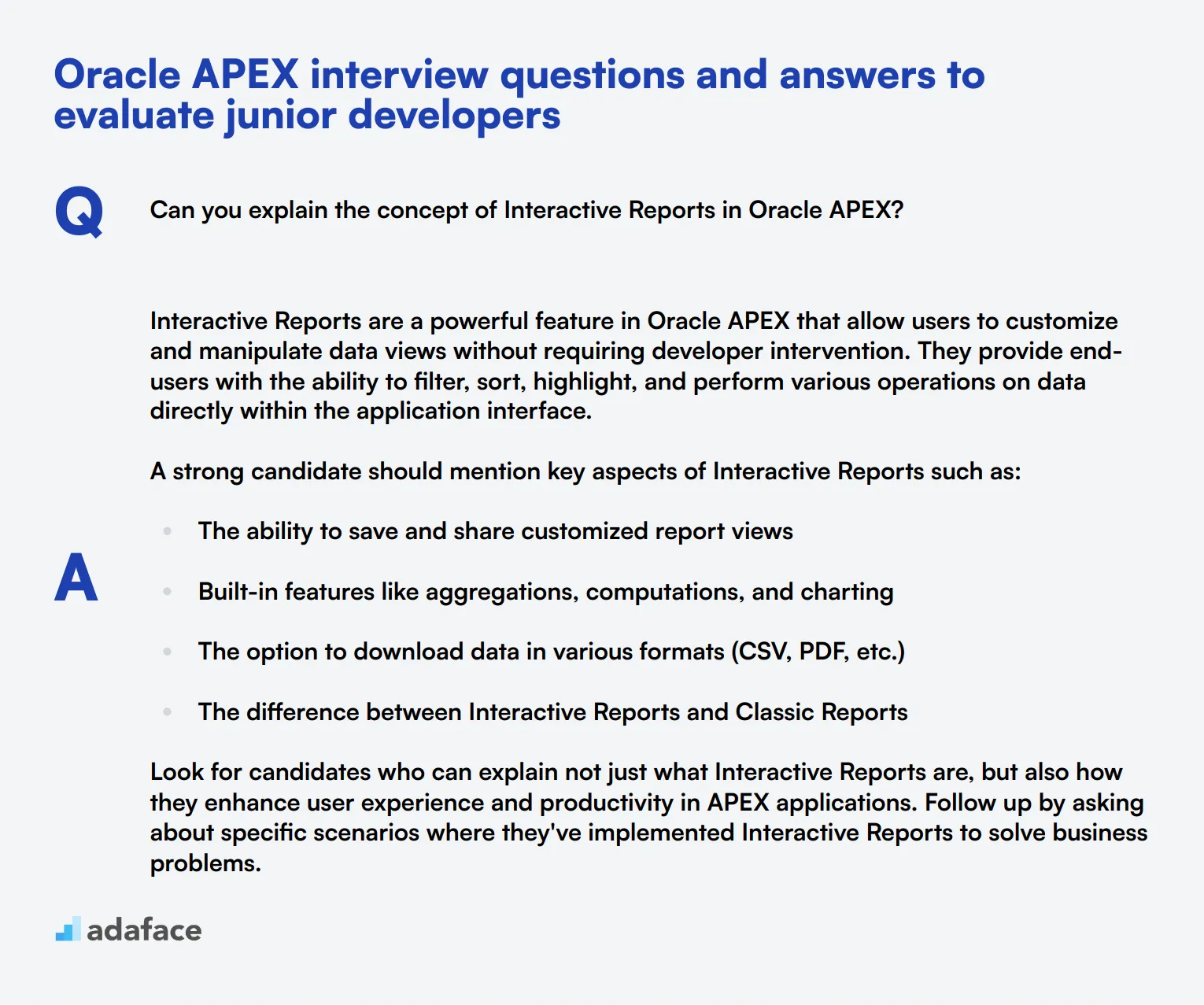
Ready to evaluate junior Oracle APEX developers? These 8 questions will help you gauge their foundational knowledge and problem-solving skills. Use this list to assess candidates effectively, ensuring you identify those with the right mix of technical understanding and practical aptitude for your team.
1. Can you explain the concept of Interactive Reports in Oracle APEX?
Interactive Reports are a powerful feature in Oracle APEX that allow users to customize and manipulate data views without requiring developer intervention. They provide end-users with the ability to filter, sort, highlight, and perform various operations on data directly within the application interface.
A strong candidate should mention key aspects of Interactive Reports such as:
- The ability to save and share customized report views
- Built-in features like aggregations, computations, and charting
- The option to download data in various formats (CSV, PDF, etc.)
- The difference between Interactive Reports and Classic Reports
Look for candidates who can explain not just what Interactive Reports are, but also how they enhance user experience and productivity in APEX applications. Follow up by asking about specific scenarios where they've implemented Interactive Reports to solve business problems.
2. How would you implement a master-detail relationship in an APEX application?
Implementing a master-detail relationship in an APEX application typically involves creating two regions on a page: one for the master record and another for the related detail records. The process usually includes:
- Creating a page with a form region for the master record
- Adding an Interactive Grid or Report region for the detail records
- Setting up a relationship between the two regions using page items or column conditions
- Configuring the detail region to refresh when the master record changes
A proficient candidate should be able to explain how to use the 'Source' attribute of the detail region to filter records based on the master record's primary key. They might also mention using Dynamic Actions to refresh the detail region automatically when the master record is changed.
Pay attention to whether the candidate discusses considerations like performance optimization for large datasets or mentions alternative approaches like using separate pages for master and detail views. Their answer should demonstrate an understanding of both the technical implementation and the user experience aspects of master-detail relationships in APEX applications.
3. What are the advantages of using Application Items in Oracle APEX?
Application Items in Oracle APEX are global variables that can be used across multiple pages within an application. The main advantages of using Application Items include:
- Persistent storage of values throughout a user's session
- Ability to share data across different pages without passing parameters
- Improved performance by reducing database queries for frequently used data
- Enhanced security by storing sensitive information server-side
A knowledgeable candidate should explain that Application Items are ideal for storing user preferences, session-specific data, or application-wide settings. They might also mention that Application Items can be set and retrieved using PL/SQL, making them versatile for various scenarios.
Look for answers that demonstrate an understanding of when to use Application Items versus Page Items. A strong candidate might discuss real-world examples of how they've used Application Items to solve specific challenges in APEX development, such as implementing user authentication or managing application state across multiple pages.
4. How do you handle file uploads in an Oracle APEX application?
Handling file uploads in Oracle APEX involves several steps:
- Creating a page with a File Browse item
- Configuring the 'File Upload' process on the page
- Defining the storage location (database table or file system)
- Implementing server-side logic to process and store the uploaded file
A competent candidate should mention that APEX provides built-in processes for file uploads, which can be customized using PL/SQL. They should be able to explain how to use the APEX_APPLICATION.G_FILES collection to access uploaded file details and how to implement file size and type restrictions.
Pay attention to whether the candidate discusses security considerations, such as validating file types and scanning for malware. Also, look for mentions of best practices like using BLOB columns for database storage or implementing progress bars for large file uploads. A thorough answer might include discussion on how to handle multiple file uploads or integration with cloud storage services.
5. Explain the concept of Substitution Strings in Oracle APEX and provide an example of their use.
Substitution Strings in Oracle APEX are placeholders that are replaced with actual values when a page is rendered. They allow developers to create dynamic content and reusable components. Substitution strings are denoted by an ampersand (&) followed by the string name.
Common types of substitution strings include:
- Built-in substitution strings (e.g., APP_USER for the current user)
- Page item values (e.g., &P1_ITEM. for the value of P1_ITEM)
- Application items (e.g., &APP_ITEM.)
- SQL and PL/SQL expressions
A strong candidate should provide a practical example, such as using a substitution string in a SQL query to filter results based on a page item value: SELECT * FROM employees WHERE department_id = &P1_DEPARTMENT_ID. Look for explanations that cover both the syntax and the contexts where substitution strings are most useful, such as in SQL queries, PL/SQL code, or HTML regions. Candidates who discuss potential pitfalls (like SQL injection risks) and how to mitigate them demonstrate a deeper understanding of the concept.
6. How would you implement row-level security in an Oracle APEX application?
Implementing row-level security in an Oracle APEX application typically involves the following steps:
- Creating a security policy at the database level using Virtual Private Database (VPD)
- Implementing application context to store user-specific information
- Using the APEX_UTIL.SET_SESSION_STATE to set session state on login
- Modifying queries in the application to include security predicates
A knowledgeable candidate should explain that row-level security ensures users can only access data they are authorized to see. They might mention using the APEX_ACL package for managing Access Control Lists or implementing custom authorization schemes.
Look for answers that demonstrate an understanding of both database-level and application-level security measures. A strong candidate might discuss the trade-offs between different approaches, such as using VPD versus implementing security checks in application code. They should also mention the importance of testing security measures thoroughly and considering the performance impact of row-level security implementations.
7. What are Computation and Processes in Oracle APEX, and how do they differ?
Computations and Processes are both components in Oracle APEX used to execute logic, but they serve different purposes:
Computations:
- Execute before page rendering
- Typically used to set values of page items
- Can reference session state and perform calculations
- Often used for default values or derived fields
Processes:
- Execute after page submission
- Used for more complex operations like data manipulation
- Can include PL/SQL blocks, database actions, or web service calls
- Often used for form processing, validation, or custom business logic
A strong candidate should be able to explain that Computations are primarily used for setting values before a page loads, while Processes are used for actions that occur after user interaction. Look for examples that illustrate appropriate use cases for each. For instance, using a Computation to calculate a total based on existing values, and using a Process to save form data to the database. Candidates who discuss the execution order and how these components fit into the APEX page lifecycle demonstrate a deeper understanding of APEX architecture.
8. How would you approach debugging an Oracle APEX application?
Debugging an Oracle APEX application involves several techniques and tools:
- Using the APEX Debug mode to view detailed execution information
- Implementing custom debug messages using APEX_DEBUG API
- Analyzing server-side logs for errors and performance issues
- Utilizing browser developer tools for client-side debugging
- Employing SQL tracing and EXPLAIN PLAN for database query optimization
A proficient candidate should mention the importance of systematic debugging, starting with isolating the issue to a specific component (e.g., page, process, or query). They might discuss using conditional compilation with $IF-$THEN-$END statements for including debug code in PL/SQL.
Look for answers that demonstrate a comprehensive approach to debugging, covering both client-side and server-side aspects. Strong candidates might mention techniques like using Interactive Reports to analyze debug data or setting up custom error handling to capture and log exceptions. They should also emphasize the importance of reproducing issues in a controlled environment and the value of maintaining debug logs for troubleshooting production issues.
18 intermediate Oracle APEX interview questions and answers to ask mid-tier developers
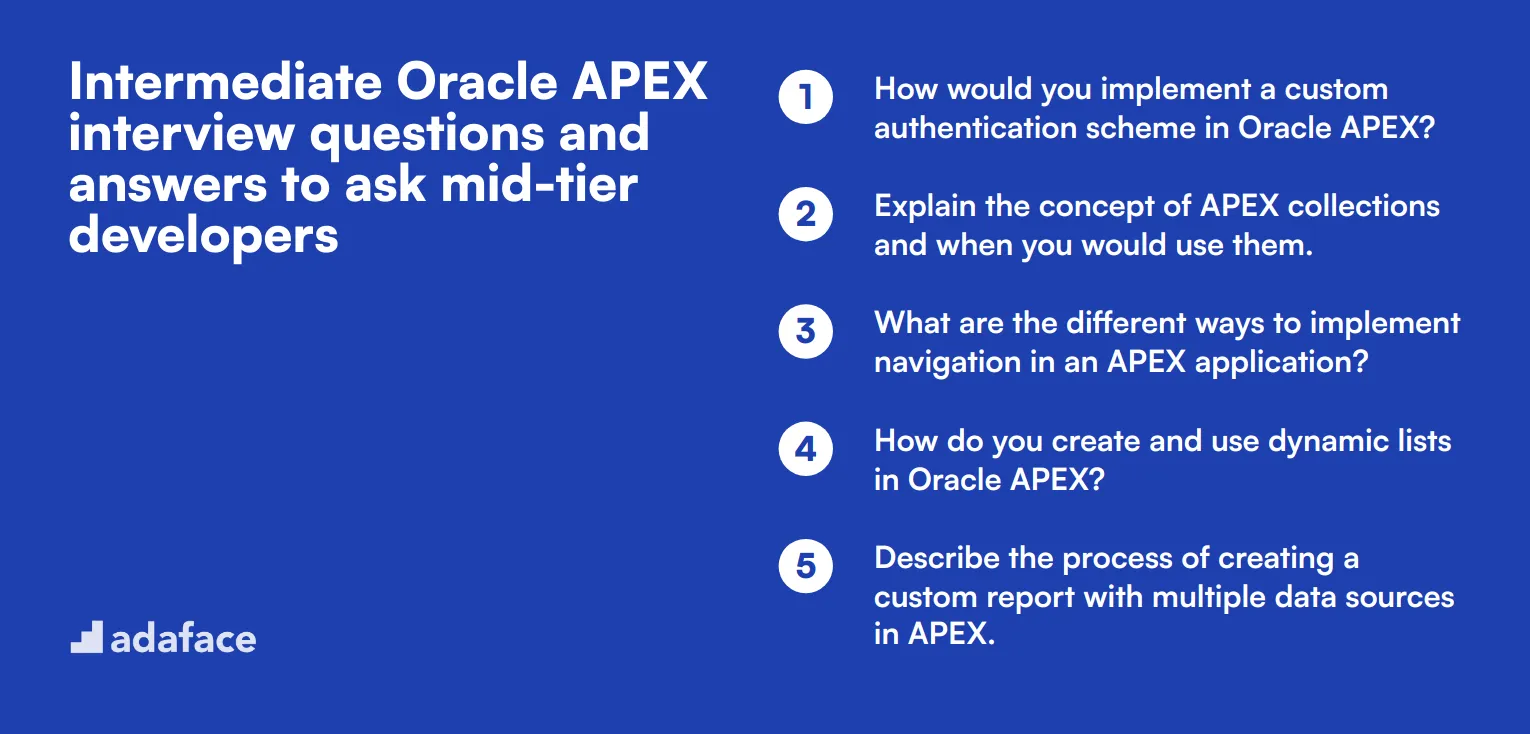
To assess the capabilities of mid-tier Oracle APEX developers, consider using these 18 intermediate interview questions. These questions are designed to evaluate a candidate's understanding of APEX's advanced features and their ability to implement complex functionalities.
- How would you implement a custom authentication scheme in Oracle APEX?
- Explain the concept of APEX collections and when you would use them.
- What are the different ways to implement navigation in an APEX application?
- How do you create and use dynamic lists in Oracle APEX?
- Describe the process of creating a custom report with multiple data sources in APEX.
- What are APEX error handling techniques, and how would you implement them?
- How do you integrate third-party JavaScript libraries into an APEX application?
- Explain the concept of APEX session state and its importance in application development.
- How would you implement a multi-step form wizard in Oracle APEX?
- What are the best practices for organizing and structuring large APEX applications?
- How do you implement data export functionality in various formats (CSV, Excel, PDF) in APEX?
- Describe the process of creating and using dynamic actions with JavaScript callbacks.
- How would you implement real-time data updates in an APEX application?
- What are the different ways to optimize database queries in an APEX application?
- How do you implement and manage global page in Oracle APEX?
- Explain the concept of APEX authorization schemes and how to implement them.
- How would you approach integrating a complex charting library like D3.js in an APEX application?
- Describe the process of creating and using dynamic regions in Oracle APEX.
9 advanced Oracle APEX interview questions and answers to evaluate senior developers
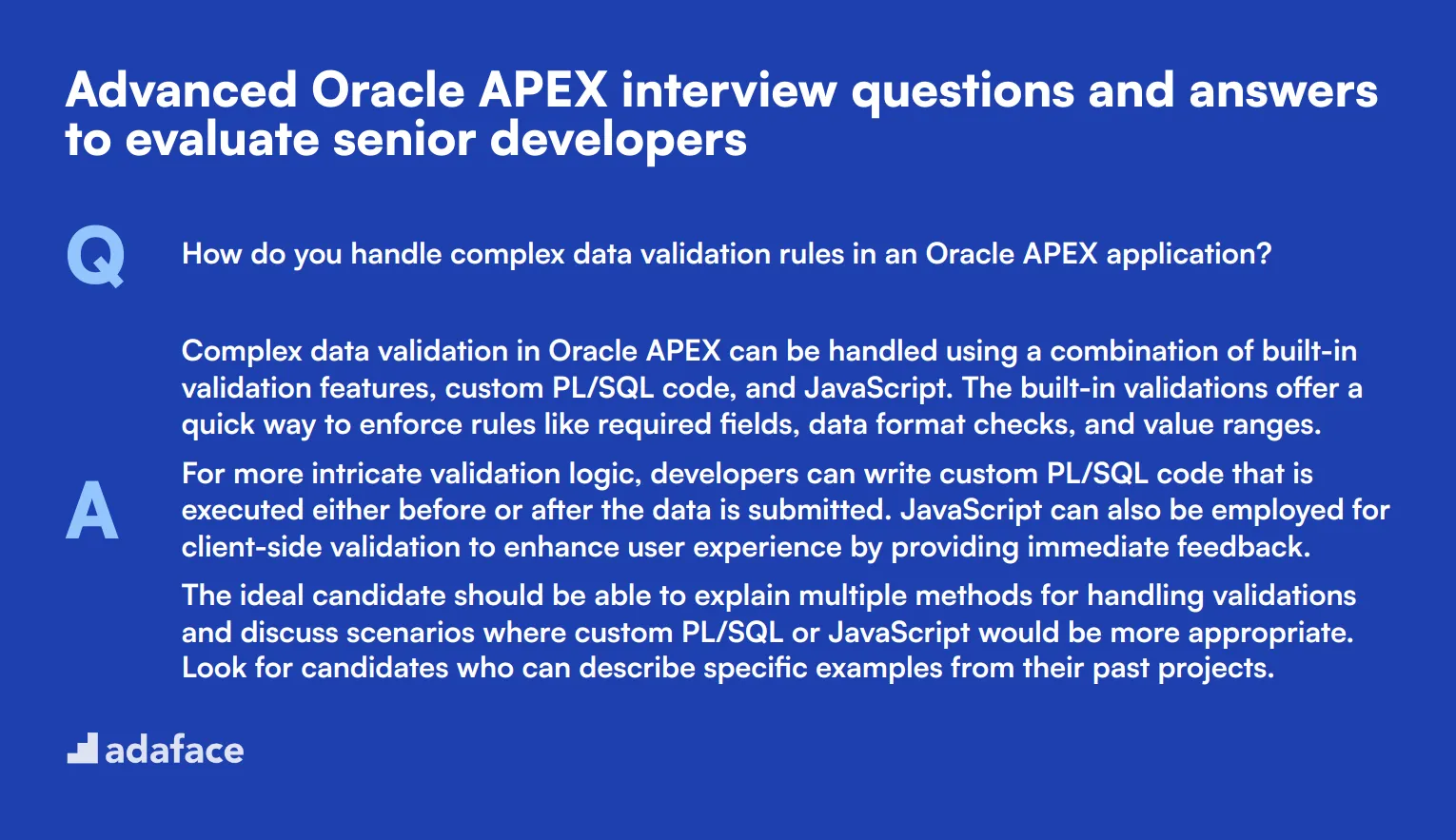
To determine whether your applicants have the right skills to tackle advanced Oracle APEX development tasks, ask them some of these 9 interview questions. These questions will help you evaluate the depth of their knowledge and their ability to solve complex problems within the APEX environment.
1. How do you handle complex data validation rules in an Oracle APEX application?
Complex data validation in Oracle APEX can be handled using a combination of built-in validation features, custom PL/SQL code, and JavaScript. The built-in validations offer a quick way to enforce rules like required fields, data format checks, and value ranges.
For more intricate validation logic, developers can write custom PL/SQL code that is executed either before or after the data is submitted. JavaScript can also be employed for client-side validation to enhance user experience by providing immediate feedback.
The ideal candidate should be able to explain multiple methods for handling validations and discuss scenarios where custom PL/SQL or JavaScript would be more appropriate. Look for candidates who can describe specific examples from their past projects.
2. Can you explain how you would manage session state in a complex Oracle APEX application?
Managing session state in Oracle APEX involves understanding how APEX keeps track of user interactions, page items, and application items. Developers can use APEX session state to store temporary data that users generate during their interactions with the application.
Effective session management includes utilizing collections for temporary data storage, leveraging global application items for data that needs to persist across pages, and ensuring sensitive data is protected by using appropriate security measures.
An ideal candidate should demonstrate a clear understanding of session state mechanisms and how to use them efficiently. They should also highlight any experiences with managing session state in large or complex applications.
3. Describe your approach to implementing a custom report with multiple data sources in Oracle APEX.
To implement a custom report with multiple data sources in Oracle APEX, I would first identify the data sources and determine how they can be combined. This could involve creating a SQL query that joins different tables or views, or using Web Source Modules to fetch data from external APIs.
Once the data sources are identified and the query is constructed, I would create an APEX report region to display the data. Advanced formatting and interactive features can then be added to the report to meet the specific requirements of the application.
Look for candidates who can explain how they have managed data from multiple sources in the past and how they ensure data integrity and performance. An understanding of how to troubleshoot and optimize these reports is also crucial.
4. How do you approach integrating third-party JavaScript libraries into an Oracle APEX application?
Integrating third-party JavaScript libraries into an Oracle APEX application involves including the library files in your application, usually by adding them to the Shared Components section. External libraries can be linked via URLs or uploaded directly to the application.
Once the library is included, you can use its functions in your dynamic actions, page processes, or custom JavaScript code. Proper testing is essential to ensure compatibility and functionality within the APEX environment.
Ideal responses should include specific examples of third-party libraries they have used and how they addressed any challenges that arose. Candidates should also demonstrate an understanding of best practices for integrating and maintaining these libraries.
5. Explain how you would implement a multi-step form wizard in Oracle APEX.
Implementing a multi-step form wizard in Oracle APEX typically involves creating multiple pages, each representing a step in the wizard. Navigation between these pages can be managed using buttons and branches.
To maintain state across the steps, session state and application items can be used to store user inputs. Validations and processes can be added at each step to ensure data integrity before moving to the next step.
Look for candidates who can describe the process in detail and provide examples from their experience. They should also mention how they handle issues such as user navigation (e.g., back and forward buttons) and data validation between steps.
6. What strategies do you use to optimize performance in a large Oracle APEX application?
Optimizing performance in a large Oracle APEX application involves several strategies, such as optimizing SQL queries, using indexes, and minimizing the use of complex joins or subqueries. Caching frequently accessed data can also significantly improve performance.
On the front-end, reducing page load times by optimizing images, minimizing JavaScript and CSS files, and using asynchronous processing where possible can help. Additionally, regularly monitoring performance and using APEX's built-in performance diagnostic tools can identify and address bottlenecks.
An ideal candidate should discuss specific techniques they have used to optimize performance in previous projects. They should also demonstrate an understanding of both backend and frontend optimization strategies.
7. Can you explain the concept of APEX collections and how you would use them?
APEX collections are temporary data structures that can store rows of data during a user's session. They are useful for managing data that does not need to be committed to the database immediately, such as data in a multi-step process or data that needs to be aggregated from multiple sources.
Collections can be created, manipulated, and queried using APEX’s built-in PL/SQL APIs. They are particularly useful for scenarios where you need to perform complex data manipulations before persisting the data.
Candidates should be able to explain the benefits and limitations of using APEX collections and provide examples of when they have utilized them in their applications. Look for responses that demonstrate a deep understanding of how collections can enhance application functionality.
8. How would you approach debugging an Oracle APEX application?
Debugging an Oracle APEX application involves using the built-in debugging tools provided by APEX, such as the debug mode, which logs detailed information about page processes, validations, and computations. Reviewing these logs can help identify where issues are occurring.
Additionally, using browser developer tools to inspect elements, debug JavaScript, and monitor network activity can be invaluable. For backend issues, reviewing PL/SQL code and using tools like Oracle SQL Developer for more in-depth analysis is essential.
An ideal response should highlight specific debugging techniques and tools the candidate has used in the past. They should also demonstrate a methodical approach to isolating and resolving issues.
9. Describe the process of creating and using dynamic regions in Oracle APEX.
Dynamic regions in Oracle APEX are regions whose content can change based on user interactions or other conditions. Creating dynamic regions typically involves using the Dynamic Content region type and providing PL/SQL or JavaScript code that generates the content dynamically.
These regions can respond to user inputs, such as selections from a dropdown menu, and update their content without requiring a full page reload. This can enhance user experience and make applications more interactive.
Look for candidates who can describe specific scenarios where they have implemented dynamic regions and the benefits they observed. They should also discuss any challenges they faced and how they overcame them.
12 Oracle APEX questions related to processes and tasks
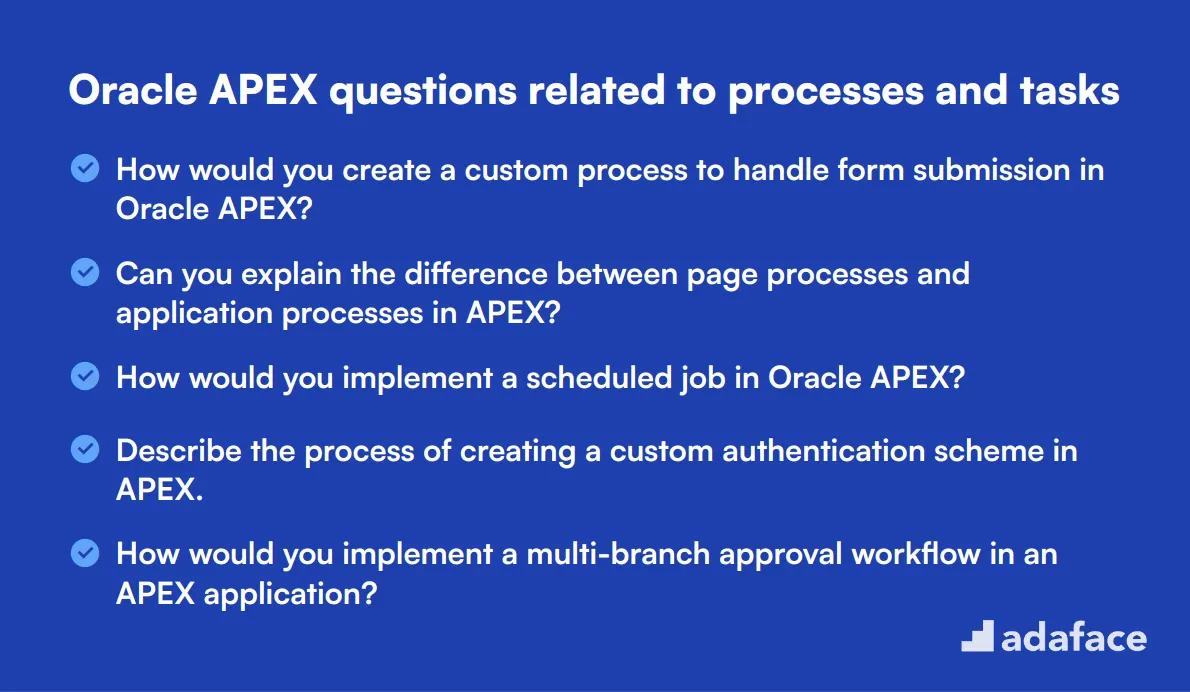
To assess a candidate's proficiency in Oracle APEX processes and tasks, consider using these 12 interview questions. These queries will help you evaluate an applicant's understanding of APEX's core functionalities and their ability to implement complex features efficiently.
- How would you create a custom process to handle form submission in Oracle APEX?
- Can you explain the difference between page processes and application processes in APEX?
- How would you implement a scheduled job in Oracle APEX?
- Describe the process of creating a custom authentication scheme in APEX.
- How would you implement a multi-branch approval workflow in an APEX application?
- Can you explain how to use APEX_COLLECTION API for temporary data storage?
- How would you implement a data synchronization process between two tables in APEX?
- Describe the process of creating a custom PDF report in Oracle APEX.
- How would you implement a file upload process with virus scanning in APEX?
- Can you explain how to use APEX_MAIL to send emails with attachments?
- How would you implement a custom error logging mechanism in an APEX application?
- Describe the process of creating a dynamic SQL report with user-defined filters in APEX.
10 Oracle APEX questions related to technical knowledge and definitions
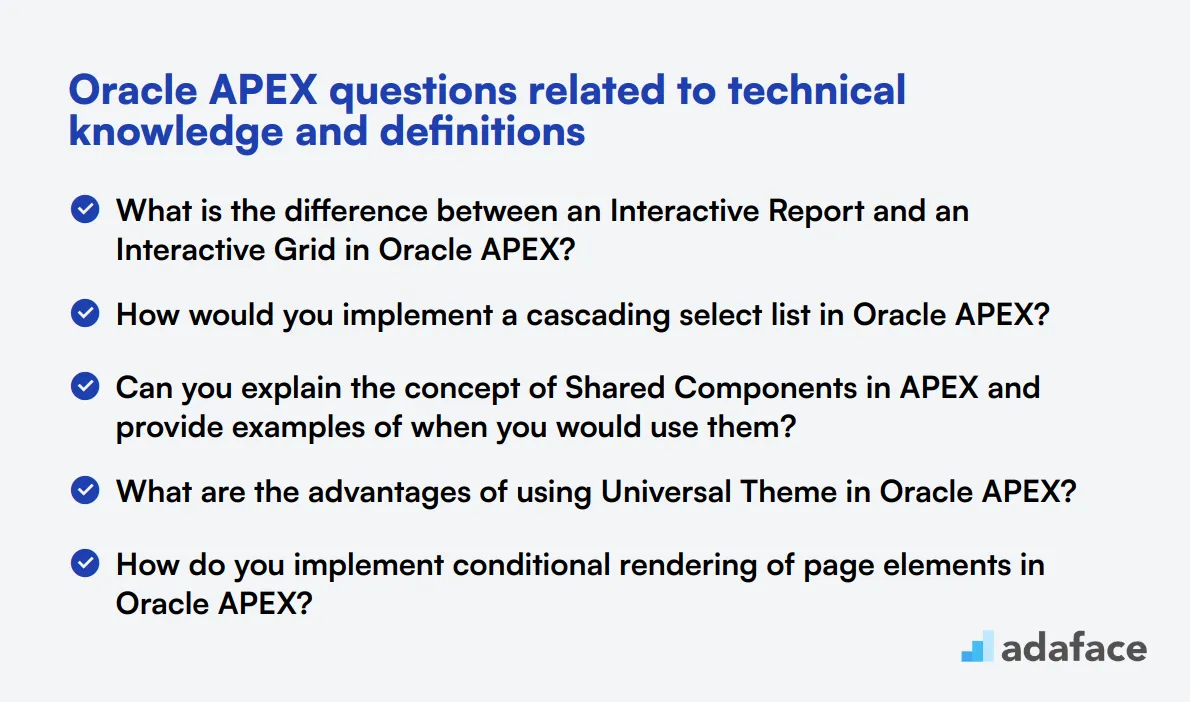
To assess candidates' technical knowledge and understanding of Oracle APEX, use these 10 interview questions. They are designed to help hiring managers evaluate a candidate's grasp of key concepts and their ability to articulate complex ideas in simple terms.
- What is the difference between an Interactive Report and an Interactive Grid in Oracle APEX?
- How would you implement a cascading select list in Oracle APEX?
- Can you explain the concept of Shared Components in APEX and provide examples of when you would use them?
- What are the advantages of using Universal Theme in Oracle APEX?
- How do you implement conditional rendering of page elements in Oracle APEX?
- What is the purpose of the APEX_UTIL package and can you give an example of its use?
- How would you implement a custom login page in Oracle APEX?
- Can you explain the difference between Application Items and Page Items in APEX?
- What is the purpose of the apex.server.process() function and how would you use it?
- How do you implement globalization and localization in an Oracle APEX application?
Which Oracle APEX skills should you evaluate during the interview phase?
While it's challenging to assess every aspect of a candidate's Oracle APEX expertise in a single interview, focusing on core skills can provide valuable insights. The following key areas are particularly important to evaluate during the Oracle APEX interview process.
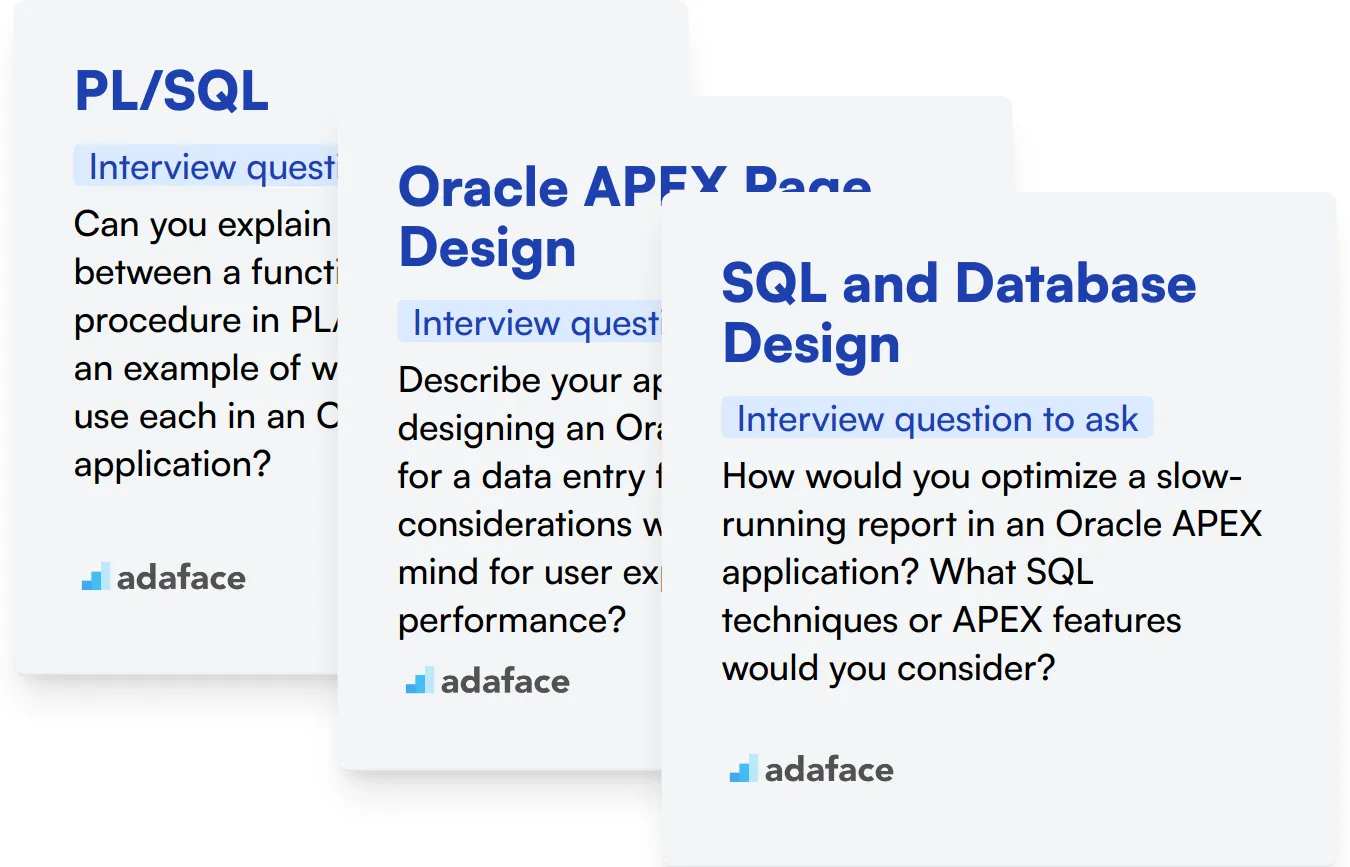
PL/SQL
PL/SQL is the backbone of Oracle APEX development. It's used for creating dynamic content, processing form submissions, and interacting with the database.
To assess PL/SQL proficiency, consider using an SQL coding test. This can help filter candidates based on their practical coding abilities.
During the interview, you can ask targeted questions to gauge the candidate's PL/SQL knowledge. Here's an example:
Can you explain the difference between a function and a procedure in PL/SQL, and provide an example of when you would use each in an Oracle APEX application?
Look for answers that demonstrate understanding of return values, side effects, and practical application within APEX. A strong candidate will provide clear examples of using functions for calculations and procedures for complex operations.
Oracle APEX Page Design
Effective page design in Oracle APEX is crucial for creating user-friendly and responsive applications. It involves understanding APEX's declarative development approach and UI components.
To assess this skill, consider asking a question about page layout and design principles:
Describe your approach to designing an Oracle APEX page for a data entry form. What considerations would you keep in mind for user experience and performance?
Listen for mentions of responsive layout, appropriate item types, validation, and error handling. A good answer will also touch on performance considerations like lazy loading and proper use of dynamic actions.
SQL and Database Design
Strong SQL skills and database design knowledge are essential for Oracle APEX development. These skills enable efficient data retrieval and manipulation within APEX applications.
Consider using an SQL online test to evaluate candidates' SQL proficiency before the interview.
During the interview, you can ask a question to assess their understanding of SQL in the context of APEX:
How would you optimize a slow-running report in an Oracle APEX application? What SQL techniques or APEX features would you consider?
Look for answers that mention query optimization techniques, proper indexing, and APEX-specific features like Interactive Reports or Lazy Loading. A strong candidate will discuss the balance between database performance and APEX configuration.
3 Strategic Tips for Leveraging Oracle APEX Interview Questions
Before you begin utilizing the Oracle APEX interview questions discussed in this post, here are some strategic tips to ensure you are effectively assessing your candidates.
1. Implement Pre-Interview Skills Tests
Incorporating skills tests prior to the interview process is a strategic move to screen candidates effectively. This preliminary step helps ensure that only those who meet the necessary technical criteria move forward to the interview stage.
For Oracle APEX roles, consider utilizing specific skills assessments such as the Oracle PL/SQL Online Test or the Data Modeling Test, which are tailored to evaluate the core competencies required for the role.
Employing these tests early in the recruitment process can save time and resources, allowing you to focus on interviewing candidates who have already demonstrated a requisite level of technical expertise.
2. Carefully Select Interview Questions
With limited time during interviews, choosing the right questions is key to effectively evaluate candidates. Focus on questions that assess critical skills needed for the role.
Explore relevant questions from areas like SQL Online Test and Data Structures, which complement the technical skills for Oracle APEX developers. Also consider including soft skills assessments like communication or problem-solving to get a holistic view of the candidate.
This approach ensures a balanced assessment, covering both technical prowess and soft skills, crucial for determining the right fit for your organization.
3. Emphasize Follow-Up Questions
Beyond the initial response, follow-up questions are essential to probe deeper into a candidate's understanding and authenticity. They help uncover not only technical competence but also how candidates approach problem-solving and adaptability.
For example, if a candidate discusses their approach to using Oracle APEX for building applications, a good follow-up could be asking them to explain challenges they faced and how they overcame them. This reveals more about their hands-on experience and resilience.
Leverage Oracle APEX Interview Questions and Skills Tests to Identify Top Talent
When hiring for roles requiring Oracle APEX expertise, accurately assessing candidate skills is key. A reliable way to measure these skills is through specialized skills tests. Consider utilizing tests such as the Oracle PL/SQL Online Test or the SQL Online Test to ensure candidates meet your requirements.
After candidates complete the skills tests, you can effectively shortlist the top performers for interviews. For a seamless hiring process, direct your next steps towards setting up interviews by signing up at our dashboard or exploring more on our online assessment platform.
Oracle PL SQL Online Test
Download Oracle APEX interview questions template in multiple formats
Oracle APEX Interview Questions FAQs
Oracle Application Express (APEX) is a low-code development platform for building scalable, secure enterprise apps.
APEX is a specialized tool used by many large enterprises. Assessing skills in this area ensures you hire candidates who can efficiently work within these environments.
Look for skills in SQL, PL/SQL, web development, understanding of Oracle databases, and experience with APEX-specific tools.
Divide the interview into sections: basic understanding, junior developer skills, intermediate knowledge, senior expertise, processes and tasks, and technical definitions.
While not mandatory, certification can be an indicator of a candidate’s commitment and proficiency with Oracle APEX.
Yes, Oracle APEX supports responsive web applications, which can be optimized for mobile devices.

40 min skill tests.
No trick questions.
Accurate shortlisting.
We make it easy for you to find the best candidates in your pipeline with a 40 min skills test.
Try for freeRelated posts
Free resources




